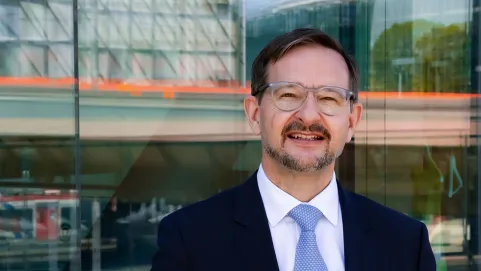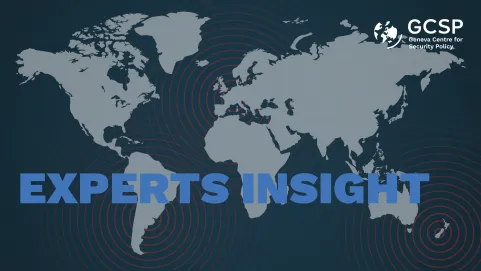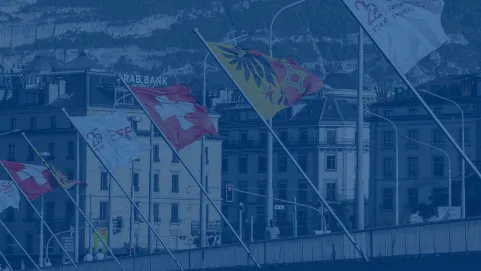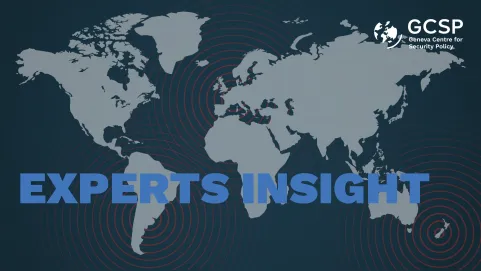The Geneva Centre for Security Policy podcast is your gateway to top conversations on international peace and security. It will bring you timely, relevant analysis from across the globe with over 1,000 multi-disciplinary experts speaking at 120 events and 80 courses every year. Click subscribe, download on your favourite podcast player, get notified each time we release our weekly episode.
Podcast Episode 18
Host: Hello, my name is Claire and welcome to this week's episode of the Geneva Centre for Security Policy podcast on the latest issues, advancing peace, security and international cooperation. Latin America is a region vulnerable to the current international climate. Even though the continent has made big economic strides in recent years, it's often still affected by political and economic unrest. We discussed its current challenges with Dr Elena Lazarou, an Associate Fellow at Chatham House. Her research focuses on EU relations with Brazil and Latin America. And Central Asia and the West Balkans has emerged as a key region with significant security challenges. In recent years, its nations have experienced conflict over borders, political unrest and inter-ethnic violence. We discuss these issues with Dr Pal Dunay, a professor at George C. Marshall European Center for Security Studies.
Host: Latin America is known for its political instability and economic tension. Earlier we spoke to Dr Elena Lazarou and Associate Fellow at Chatham House.
Disclaimer: this interview took place 18 March 2020. Events may have changed since this date. The below transcription is the full interview, we had to remove parts from the audio version for reasons of length.
Ms Ashley Müller: Thank you Dr Lazarou for joining us with the GCSP today. May I first ask you what is that EU policy towards Latin America?
Dr Elena Lazarou: EU policy towards Latin America is difficult to describe in a short amount of time. In general Latin America is perceived as a region that shares a lot of values with the EU. It's a large region, which, by and large, is committed to international law. It's a democratic region. It's committed to issues that are very close to the core of the EU’s interests and pursuits in the global scenario. So, multilateralism, combating climate change, establishing norms at the international level for the global governance of new and emerging challenges such as cyber security, the norms governing the use of artificial intelligence. So, in general, the EU views the region as a region that is, in many ways likeminded, that faces some of the same challenges as the EU. But obviously it recognises that another number of challenges are very, very different given different levels of development and industrialisation of the two regions. So if I would, sort of summarise the policy of the EU towards the region, it is to, on the one hand, engage and work together towards the pursuit of common interests on the global scenario; to encourage regional integration in the Latin American region; to an extent to support the region's development and there we see a lot of divergences within the region because obviously, we have states at different levels of development. So, some continue to be recipients of development aid but more and more, we're seeing the EU approaching the region more in terms of partnerships rather than as recipients of aid. So that's the one side - working together for issues of common interest and common pursuits – and on the other hand, assisting the region in those ways that I mentioned - in the new ways of cooperation - through various partnership instruments for its own development and its own pursuit of integration. So, this is by and large the objective, I would say that these have been the objectives for the past 20 years at least. Essentially since 1999, when the EU and Latin America established a strategic partnership. Now throughout these 20 years, of course, we've seen different tools and different ways in which the EU pursues these interests in the region and these goals, and they have to do - these tools and instruments - with various different types of engagement be they trade agreements, association agreements or strategic partnerships with different countries and different regional groupings. We've seen several EU strategies in the region and the most recent one was the new strategy proposed in 2019 (so last year) by the previous High Representative for EU foreign policy Federica Mogherini.
Ms Ashley Müller: What challenges currently face the Latin American region? Obviously, we have coronavirus at the moment, but of course, it's the immediate answer. However, if there are other examples that you could also provide, please?
Dr Elena Lazaro: Of course, I always speak about the region with caution because, it's a vast and diverse region. Latin America as a concept encompasses very different parts of the Americas with different sets of challenges. So, we have the Central American countries, we have Mexico, which is in many ways engaged with North America through the new NAFTA agreement and other agreements. And we have South America, which is a region on its own. And within South America, we have different groupings. So, it's always hard to talk about the common challenges. But if I were to take a step back and look at the macro level and say, what are the big challenges right now? I'll start with the coronavirus, because I think this is, of course, this is a global challenge. But it is also very pertinent to the region because it touches on at least three issues that have been there for a while and three challenges that have been there for a while.
The first is the challenge of regional integration, regional cooperation. This is always a challenge in the Americas, and I would say most of Latin America and South America in the sense of getting some substantial, robust and sustainable regional cooperation format off the ground. We've seen the region attempting to do so, several times over the past 20 years. There's several regional formats in the region such as CELAC, MERCOSUR, the Pacific Alliance, which do exist, have a greater or lesser degree of institutionalisation, many of them become obsolete after a while because of the changes in power dynamics. So, the one big challenge of the region which has always been to work closer together, I think it is exacerbated by the coronavirus in a sense because it is a transborder problem. It's a problem that the region, the world in fact, has to face together and it definitely touches upon this issue of how to work together. We saw two days ago that the members of PROSUL, one of the most recently formed regional formats of cooperation have at least decided on that level, on that regional level, of how to at least share information on this crisis. So, coronavirus obviously touches on that issue of working together across the region.
A second challenge that's been there for a while and here again we should be seeing the effects of the coronavirus, is of course the economy. Economic Development is a long standing problem and challenge to the region, very much linked to the state of industrialisation, which is yet to reach the levels that that are desired in the region and therefore keeps throwing the region back every time we have a new global economic slump, or at the end of the last commodities boom. This could have helped the region rise economically for a while but then it backtracks. So, the economy is linked on the one hand to the level of industrialisation, but also the level of infrastructure development in the region and again, I think the economic effects of the coronavirus will be felt very much because the region is not as advanced as it should be in the development of infrastructure. So, that long standing challenge is also linked.
A third big challenge that Latin America faces always and consistently is, of course, social inequality. It's actually the most unequal region in the world. I can already see how this will also be something that we'll see play out during the coronavirus and the response to the coronavirus epidemic. Obviously, this inequality touches upon a number of issues such as access to education, but also access to health care. And clearly these things will come into play in the next few months. It's perhaps the biggest problem that the region has faced consistently, and which is linked to the last challenge that I wanted to mention among the many, which is democracy. Several countries in Latin America are relatively new in terms of their democratic experience, which means that we have different levels of democratisation, different levels of progress in achieving division of powers and we often see abuses of powers and corruption. Lately this discussion about democracy in Latin America has unfortunately also been linked to the rise of populism, which has brought to power several leaders that in one way or another seem to challenge the basic premises of democracy. So that challenge too is very much present in the past few years. It remains to be seen, of course, how these types of leaders will respond to this current challenge faced by humanity – this epidemic. And of course, in the end, I think I managed to link all these challenges to the virus perhaps it's the state of my mind right now. But, inevitably, the management of such a big public policy challenge is linked to all the other problems that the region faces.
Ms Ashley Muller: Yeah, absolutely. It's kind of interesting actually, to have that one common denominator to really look at the inter linkages and see how everything is so interconnected. Thank you. My next question is actually looking at the optimistic side and what are the opportunities facing the conceptual region of Latin America?
Dr Elena Lazaro: Well, the region is of course, very rich in certain commodities. So of course, how to integrate the export of these commodities both in the global trade system but also how to gradually create an industrial basis to actually become a productive part of the global industrial sector is an opportunity and we may see this in the next few years and that obviously is linked to attracting investment. So, the natural resources are there. I think one big challenge is to attract investment to attract know-how, to attract R&D, so not only export these commodities abroad, but also to bring the know-how, the innovation and the technology to Latin America. So, I think that's one promising area.
The second promising area is possibly cyber governance and everything to do with digitalisation. It's interesting because Latin America is vast in territory, but it's actually very sparsely populated if one compares it to Europe for example, not even comparing to other parts of the world. So, digitalization can in that context offer a lot of opportunities. And it remains to be seen, of course, how digitalisation will be further executed. There is a big conversation right now about which providers will bring 5G for example, to South America specifically, but also Latin America more generally. But in any case, you asked about opportunities and I think becoming even more digital is one - because parts of Latin America are already largely online. But I think becoming more digital, working even more in that area of cyber space will be something that we could see this region becoming quite advanced and it would work in its favour.
Third opportunity, although it hasn't looked that good in the past year, environmental policy, managing deforestation, let's not forget that the Amazon is in this region. There's been a lot of criticism, and rightly so, in my opinion, towards the way that the most recent fires and deforestation were managed. But, you know, looking forward and considering that there are several countries in South America specifically that do prioritise the protection of climate in their foreign policies and domestic policies, I think that if the region were to get its act straight, it could really help counter deforestation, and promote and sustain biodiversity to an extent that it would really rise as an actor as it has done before in global environmental politics. So, I would say these are the opportunities.
There are a few crises in the region that now are more challenges than opportunities. For example, resolving the political and humanitarian crisis in Venezuela would be one, overcoming the political crises in several countries where we've seen political unrest in the past year. So, for example, Colombia or Ecuador, Chile. Obviously, these have been dealt with more as crises than as opportunities. But if one were to see from the optimistic lens, this could also be opportunities to see in the future the establishment of more democratic, more legitimate and more egalitarian regimes in these countries.
Ms Ashley Muller: And my final question to you, I always love asking this question, because I hope it gives a platform for people to be able to speak about their regions and areas of expertise in a way that maybe they're not normally asked, but what is misunderstood? Is there something that maybe in Europe or in the rest of the world, we are not quite grasping about the difficulties or just the daily life or things about the region that are misunderstood?
Dr Elena Lazaro: Well I think the identity of people, the fabric of society of Latin American countries is misunderstood, particularly in the west. Latin American and South American societal identities are very, very complex, they carry in them an element of what we would call here, Western, “West-ness”, which has been inherited, indeed, through the years and because of colonisation. So there are definitely some shared values, the approach towards democracy and the education system is very much influenced by so called Western countries and at the same time, there is a self-perception - and that I think escapes Europeans and Americans and others very much at times - in Latin America of being Westerners to an extent and I think this is often forgotten. But on the other hand, this goes hand in hand with a, I would say rather significant recognition of the fact that people are all different from their counterparts in Europe and the US, there is an increasing understanding of the influence that indigenous people have played in the cultures. There is a multiculturalism within Latin American nations that is very distinct. And I think this mix of cultural heritage, which also is manifested in things like religious syncretism, or the music and the filmography of the region, something that is not understood as well by those that don't study the region, and for those who do, it's a constant exploration. So, I would say that part is not so much to do with daily life per se, but it's part of a greater understanding of how the region operates.
COURSE ADVERTISEMENT:
“We are too often caught by surprise in the present and using practices from the past to manage challenges. at the Geneva center for security policy, we help you get in front of unexpected or unwelcome events to better anticipate how the future may unfold in specific contexts. Such an approach can create the space for adaptable and resilient policymaking. I am Emily Munro, and I'm the course director for the Strategic Foresight Tools and Techniques for Planning in Uncertain Times course. at the Geneva Centre for Security Policy, we emphasize a three pronged approach to strategic anticipation, adapting mindsets, integrating futures and institutional contexts, exposure to foresight methods. In this course, we will help you develop your own toolbox of foresight methods, and explore how foresight is used by institutions, both the success stories and the obstacles encountered. We would like you to leave with the skill set on strategic foresight, a deeper level of knowledge on emerging security issues and a wider network in this field. join this course to exchange on your experience with participants and experts from different sectors and from different parts of the world. Please contact us with any questions and register directly via the GCSP website.
Host: The Western Balkans and Central Asian states currently face common security challenges from crime, corruption, terrorism, and faltering commitments to economic and democratic reform. We spoke to Dr Pal Dunay, a professor at George C. Marshall European Center for Security Studies he shared with us his thoughts on the current situation.
Dr Pal Dunay: In Central Asia, the economic transformation has not occurred; most of the production is low value added. It's either coming from natural resource exploitation or from agriculture. As a consequence, people are leaving because they are not willing to be engaged in these kinds of jobs. So basically, the entire Central Asia except for Kazakhstan is playing into the labor market of the Russian Federation and to some extent, some other countries, but 93% of all people who leave Central Asia leave it for the Russian Federation language links in history and so on and so forth. For them, the biggest challenge is that economic transformation hasn't yet taken place and the two external players which are pulling and pushing these countries are definitely the Russian Federation and China, the Russian Federation and China, which are quite lukewarm about political regimes, as long as the political regimes do not contradict much to their political regimes. So there I am really worried about a stalemate. And of course, these kinds of stalemated situations can only be managed through unconstitutional change. In some cases, Kyrgyzstan is the case in point it had two non-constitutional regime changes 2005-2010 in neither case the situation got significantly better lastingly, as a consequence, people are disillusioned and disenchanted. They turned their back on public affairs. And as a consequence, the political space was left for people who want to benefit for themselves and not necessarily for the country. We see changes Uzbekistan is now flying high, really going through a very healthy change after 26 years of dictatorial and fairly unpleasant regime. At the same time, Kazakhstan is slowing down Kazakhstan, which used to be the engine of Central Asia. But now with this kind of divided political leadership, I'm not so sure that it will maintain its advancement. So it's a lot of problems coexisting probably in Central Asia good governance is an issue of huge corruption and political disillusionment of the local population.
Host: That's all we have now for today's episode. Thank you to Dr Elena Lazarou, for joining us. How can you listen to us again next week to hear all the latest insights on international peace and security? Bye for now!
Disclaimer: The views, information and opinions expressed in this digital product are the authors’ own and do not necessarily reflect those shared by the Geneva Centre for Security Policy or its employees. The GCSP is not responsible for and may not always verify the accuracy of the information contained in the digital products.
 Latin America and other stories
">
Latin America and other stories
">
 Latin America and other stories
">
Latin America and other stories
">
 Latin America and other stories
">
Latin America and other stories
">
 Latin America and other stories
">
Latin America and other stories
">
 Latin America and other stories
">
Latin America and other stories
">
 Latin America and other stories
">
Latin America and other stories
">
 Latin America and other stories
">
Latin America and other stories
">
 Latin America and other stories
">
Latin America and other stories
">
 Latin America and other stories
">
Latin America and other stories
">

